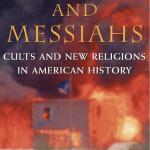 I’m writing a chapter on Matthew and Empire for a book Joe Modica and Scot McKnight are editing for IVP called Jesus is Lord, Caesar is Not! Evaluating Empire Studies Today. Besides myself other contributors include Mike Bird (Romans) and Lynn Cohick (Philippians), Allan Bevere (Colossians-Philemon), Drew Strait (Acts), Dean Pinter (Luke), Dwight Sheets (Revelation), Andy Couch (Conclusion), Judith Diehl (Scholarly survey) and David Nystrom (Roman Empire Ideology). We hope it will be an accessible evaluation of the popular trend in New Testament studies.
I’m writing a chapter on Matthew and Empire for a book Joe Modica and Scot McKnight are editing for IVP called Jesus is Lord, Caesar is Not! Evaluating Empire Studies Today. Besides myself other contributors include Mike Bird (Romans) and Lynn Cohick (Philippians), Allan Bevere (Colossians-Philemon), Drew Strait (Acts), Dean Pinter (Luke), Dwight Sheets (Revelation), Andy Couch (Conclusion), Judith Diehl (Scholarly survey) and David Nystrom (Roman Empire Ideology). We hope it will be an accessible evaluation of the popular trend in New Testament studies.
In the process of research, I’ve found a great book that evaluates post-colonial readings of the New Testament by Christopher Bryan called Render to Caesar: Jesus, the Early Church, and the Roman Superpower.
In his final chapter, he does a great service to us by asking the fundamental question:
We are bound to ask how far techniques that were developed for social analysis, as frameworks for collecting and reflecting upon data, may properly be used in historical research, where inevitably they function not really as analytic tools but rather (and perhaps primarily) as a means of reconstruction through which we try to make good the enormous holes in what we actually know . . . How far can techniques of analysis that were developed in connection with the post-Enlightenment colonial–to be precise, postcolonial–experience of cultures formerly subject to nineteenth- and twentieth-century Western domination be applied at all to the ancient, largely Mediterranean world of the Roman Empire? (113-14)
The single most important insight in the book is Bryan’s recognition of the scriptural heritage that Jesus and the early Jewish believing author’s share. What he observes about interpreters like Horsley who use post-colonial approaches is the absence of consideration of the Bible’s position on Empire. He concludes rightly that the OT has little problem with Empire as a concept or reality. Empire is not the problem. Rather the issue is how that Empire understands its relationship to Yahweh. I would quibble with aspects of his interpretation of the OT, especially I think he totally ignored the Davidic covenant in his analysis, which is a fundamental error when assessing Empire in the Bible. Still, this is a criticism that post-colonial readings of Jesus and New Testament authors need to seriously consider.
I asserted in Matthew’s Messianic Shepherd-King: In Search of ‘The Lost Sheep of the House of Israel’ that Matthew expected a future Davidic empire that would replace the kingdoms of this world (230), and I will probably make the same point again in the chapter for the IVP book. Although apparently some, like Don Garlington in his review, thought that this view was inappropriate for Matthew–even citing Bryan’s book–I think his analysis slightly misses the mark because Bryan overlooks the role of the Davidic covenant.















